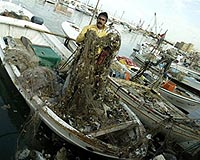 |
Nairobi (AFP) Sept 3, 2009 A sweeping drought across East Africa has left millions of people at risk of starvation, in a region plagued by increasingly erratic rainfall, humanitarian organisations and officials warn. Huge food shortages and loss of livelihood has left 6.2 million Ethiopians needing relief aid, while about 3.8 million in Kenya's arid areas, where livestock is being decimated, have also been affected, UN agencies say. War-ravaged Somalia is witnessing its worst humanitarian crisis since civil unrest erupted there two decades ago, with a third of its 10 million people in need of food assistance and one in every five children acutely malnourished. Three years ago, a searing drought put more than 11 million people in the region at risk of starvation. For Kenya, "this is the worst (drought) in nearly a decade. One in ten Kenyans are in need of food assistance," Marcus Prior, a World Food Programme spokesman in Nairobi, told AFP. "The situation is extremely serious. Rains have failed across many areas," said Prior, whose organisation recently appealed for 230 million dollars to help drought victims. In a region where small scale subsistence farming is the mainstay of a majority of the population, the impact of climate change on rainy seasons can often have dramatic consequences. Response to drought disaters have similarly been erratic and band-aid: appeals for donor aid, emergency food distributions and medical assistance, all of which quickly dry up when the first drops of rain fall. And in the absence of permanent solutions, many of those affected by drought find no respite even when the rains come as floods sweep their homes, destroy crops and cause water-borne diseases. Tanzania recently sent 40,000 tonnes of cereals to its northern regions affected by drought, and where Agriculture Minister Stephen Wasira said famine has been reported. "There are pockets of famine in northern regions... 'Short' rains failed and 'long' rains were inadequate," Wasira said, referring to the two main rainy seasons. The WFP is also feeding more than one million Ugandans, mainly in the northern and eastern regions as a prolonged drought weighs heavy on the people. "If the rains do not (increase) in the next few days then we are headed for trouble," Ugandan Information Minister Kabakumba Masiko told AFP. "Daily, we get reports of food shortage from some regions and the government has been intervening by delivering relief (food)." Ugandan livestock have also started dying and officials fear the trend will have a negative impact on meat and milk supplies to a large swathe of east Africa. "We are losing animals due to starvation because of drought especially in the cattle corridors," Ugandan state minister for animal husbandry, Bright Rwamirama told a news conference in Kampala Thursday, but gave no figures. Animals are also dying for lack of water and foliage and a result of overgrazing, the minister said. Rwamirama is the first government official to confirm death of animals in Uganda, a food basket for Sudan, Rwanda, Burundi and Kenya. Rather than suffer food and water shortages sparked by recurring droughts, east African states can take a cue from desert countries like Egypt or Sudan and use irrigation to turn around their plight, experts argue. "We wait for harsh events to occur and then run in panic," said Kenyan soil scientist Peter Okoth. "Irrigation would certainly overcome the perennial drought." "It's a shame that we are actually begging for food yet we have a lot of water and we have enough land that is lying idle." Food shortages also spark an increase in commodity prices, feeding a vicious cycle that drives millions closer to starvation. According to official figures, food prices in Uganda increased by six percent in the last month, while the cost of electricity in neighbouring Kenya rose by 6.5 percent after two key hydroelectric dams shut due to low water levels. However, forecasters are predicting above-average rainfall in the coming months to last up to early 2010 due to an El Nino phenomenon expected to ease the harsh drought. Share This Article With Planet Earth
Related Links Farming Today - Suppliers and Technology
 First global illegal fishing treaty agreed: UN
First global illegal fishing treaty agreed: UNRome (AFP) Sept 1, 2009 A group of 91 countries have agreed on a treaty that will block ships involved in illegal fishing from entering signatory ports and thus help prevent the fish going to market, the UN said on Tuesday. The UN's Food and Agricultural Organisation (FAO) hailed the agreement to prevent, deter and eliminate illegal, unreported and unregulated fishing as "the first ever global treaty focused ... read more |
|
| The content herein, unless otherwise known to be public domain, are Copyright 1995-2009 - SpaceDaily. AFP and UPI Wire Stories are copyright Agence France-Presse and United Press International. ESA Portal Reports are copyright European Space Agency. All NASA sourced material is public domain. Additional copyrights may apply in whole or part to other bona fide parties. Advertising does not imply endorsement,agreement or approval of any opinions, statements or information provided by SpaceDaily on any Web page published or hosted by SpaceDaily. Privacy Statement |